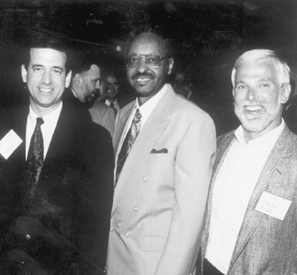| Wisconsin
Congressional Watch |
Issue is "fair trade" not
"fast track"
A recent NBC/Wall Street Journal poll showed that 61% of
Americans surveyed opposed giving the President "fast
track" authority for negotiating trade deals with other
counties.
The survey found most Americans want fair and balanced trade,
but by overwhelming margins believe Congress should play a role
in crafting the nation's trade agreements.
"Fast-track" authority would allow the President to
negotiate trade agreements that Congress could not amend, forcing
a straight up or down vote on any agreement.
Proponents argue that "fast-track" authority
improves the President's credibility and strength at the
bargaining table. Noting that every President since Jimmy Carter
has been given similar authority, "fast-track"
proponents argue that it is necessary if US products are to
compete in an increasingly fast-paced global marketplace.
Opponents of "fast-track" are also concerned about
America's ability to compete in a global economy. However, they
tend to focus less on what's "fast" and more on what's
fair.
Like prevailing wage laws that are designed to prevent
contractors from undermining local wage and standards in their
quest for increased profits, opponents of "fast-track"
want comparable worker protections and environmental standards to
be in place before an agreement is reached to prevent the kind of
mass export of jobs that occurred in this country following
previous agreements.
Opponents cite the North American Free Trade Agreement (NAFTA)
and the more than 420,000 American jobs that have been lost as a
direct result of NAFTA's passage in 1993, as an example of what
will happen if Congress does not retain the right to influence
trade agreements.
In addition to actual job loss, NAFTA has given American
Corporations additional leverage to lower wages in this country
by using the threat of plant shut downs as a "bargaining
chip" to hold wages down or to thwart union organizing
efforts, and has helped convince many that "fast-track"
will simply give corporations too much power.
In November, after months of intense lobbying, the Clinton
Administration failed to produce enough support within his own
party for "fast track" legislation. Republican
leadership, working with the President, decided to postpone the
vote on the measure rather risking its defeat.
"Fast track" is not dead.
The House may decide to take up the issue again next year. If
you want to be heard on "fast track" check the
Congressional Directory listed below and call or write your
Congressman.
 |
The National AFL-CIO has taken a position against
"fast-track." Last year US Senator Russ
Feingold (left), met with Milwaukee Laborers' Local #113
Business Manager Bill Johnson (center) and Laborers'
District Council Business Manager Mike Ryan, at a
Business Managers meeting in Washington. Both Senator
Feingold and Senator Herb Kohl have sided with the
National AFL-CIO in voting against giving the President
"fast-track" authority. |
Some "fast-track" facts
- The average wage in Mexico is $4 a day.
- A 1992 Wall Street Journal poll of corporate
executives showed 40% were likely to shift production to
Mexico if NAFTA passed.
- On average, workers displaced by NAFTA found new
jobs at wages $4,400 less than previous employment.
Back to WI Laborers
